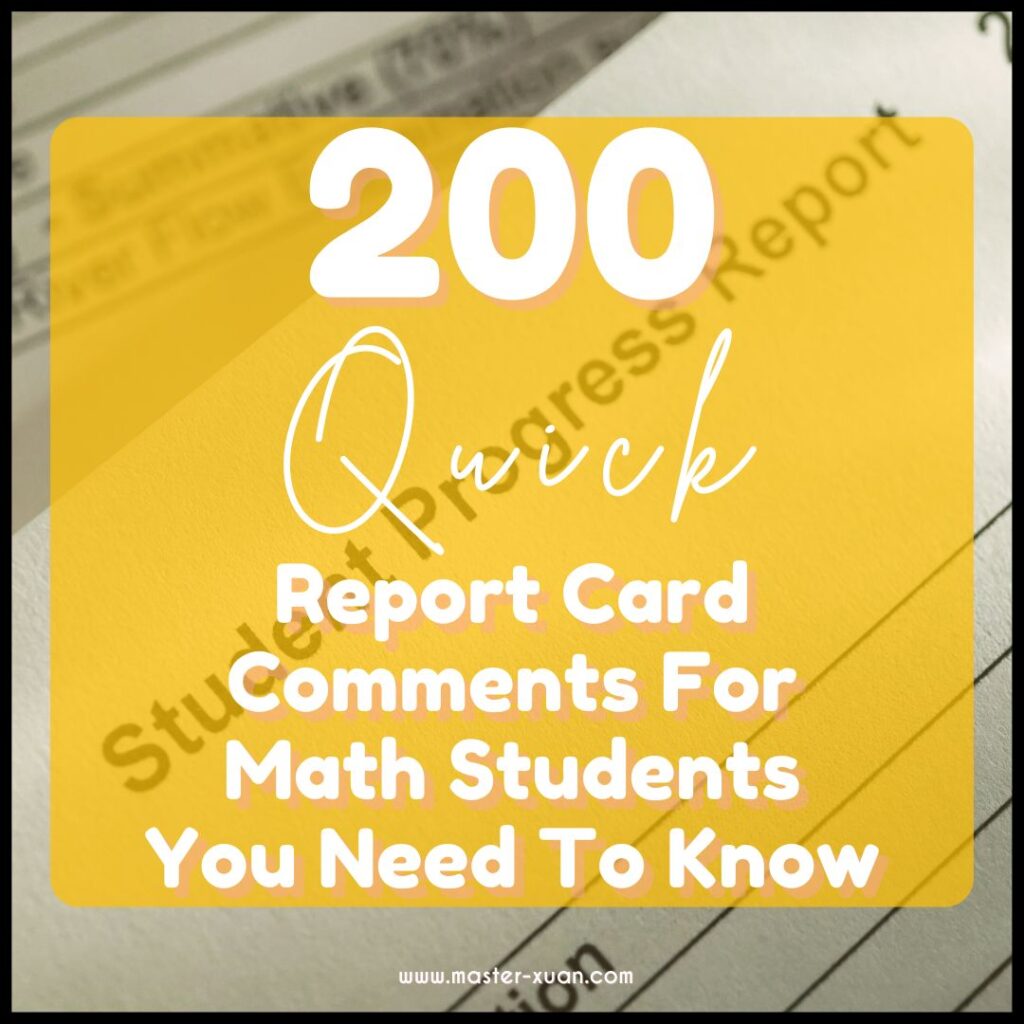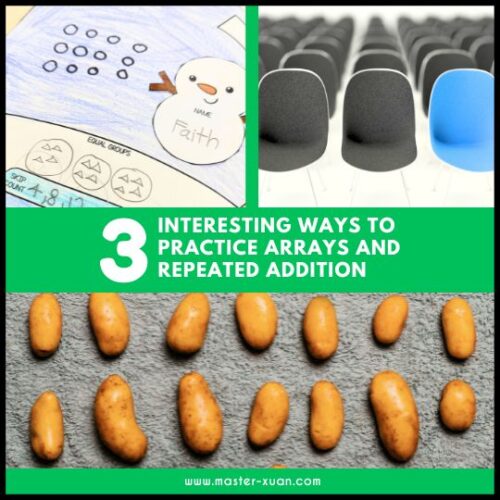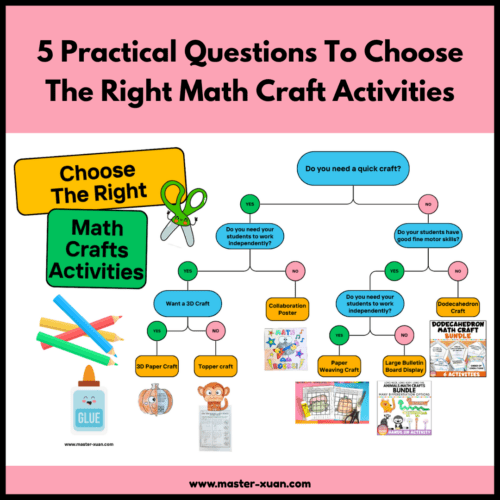Are you a teacher struggling to find the perfect report card comments for math? Writing report card comments can feel like a daunting task, especially when we want to capture a student’s unique qualities and potential.
Fear not! In this comprehensive guide, I’ve compiled over 200 report card comments for math students that you can use to provide insightful and encouraging feedback to your students.
But first, let’s clarify what report card comments are.
What are report card comments?
They’re personalized statements written by teachers to assess a student’s academic performance, behavior, and overall development. These comments are typically included on a student’s report card, along with grades or marks, to offer insights into their strengths, weaknesses, and achievements.
The goal of report card comments is to:
- Communicate effectively with parents or guardians.
- Provide valuable feedback to students.
- Foster a positive and supportive learning environment.
So, let’s check out these report card comments for math students and discover how you can use them to communicate with parents and motivate your students.
Report Card Comment Based On Behavior
Positive Report Card Comments For Math Students
Social Skills and Cooperation:
- [Student’s name] demonstrates empathy towards classmates.
- [Student’s name] demonstrates good manners and politeness.
- [Student’s name] is a good listener and shows respect for others’ opinions.
- [Student’s name] is a good role model for their classmates and sets a positive example.
- [Student’s name] is a great sportsperson and always demonstrates fair play and respect for others.
- [Student’s name] is a positive influence on the classroom and always has a kind word to say.
- [Student’s name] is a supportive and encouraging classmate who is always willing to help others.
- [Student’s name] is a team player and works well with others on group projects.
- [Student’s name] is a valuable team member and works well with others.
- [Student’s name] is able to collaborate effectively with peers and contribute to group discussions.
- [Student’s name] is able to follow directions and complete tasks without constant supervision.
- [Student’s name] is able to resolve conflicts peacefully and respectfully.
- [Student’s name] is able to share and take turns appropriately.
- [Student’s name] Is able to take initiative and lead group projects successfully.
- [Student’s name] is able to understand and manage their own emotions, as well as the emotions of others.
- [Student’s name] is always polite and respectful towards teachers and classmates.
- [Student’s name] participates in group activities with joy.
- I would like to see [Student’s name] ask for assistance when he/she is struggling to understand set work.
- It is wonderful to see [Student’s name] gaining the confidence to ask for help when needed.
Self-Control and Responsibility:
- [Student’s name] always completes homework assignments promptly.
- [Student’s name] consistently follows classroom rules and routines.
- [Student’s name] is able to adapt to new situations and challenges.
- [Student’s name] is able to control their impulses and behave appropriately in the classroom.
- [Student’s name] is able to follow rules and routines consistently.
- [Student’s name] is able to manage their time effectively and complete assignments on time.
- [Student’s name] is able to manage their time effectively and complete assignments on time.
- [Student’s name] is able to prioritize their tasks and manage their time effectively.
- [Student’s name] is able to regulate their emotions and behavior effectively.
- [Student’s name] is able to regulate their emotions and respond to situations calmly.
- [Student’s name] is able to set goals for themselves and work towards achieving them.
- [Student’s name] is able to take care of themselves and complete basic tasks independently.
- [Student’s name] is able to take initiative and complete tasks without being prompted.
- [Student’s name] is able to work independently and take responsibility for their own learning.
- [Student’s name] is beginning to understand that his/her constant calling out is affecting his/her ability to focus on the task at hand.
- [Student’s name] is learning how to listen to instructions better.
- [Student’s name] is organized and keeps their workspace tidy.
- [Student’s name] is responsible for their own actions and takes ownership of their mistakes.
- [Student’s name] sets realistic goals for themselves and works diligently to achieve them.
- [Student’s name] shows remarkable progress in handwriting.
Positive Attitude and Motivation:
- [Student’s name] has a positive attitude towards learning and is always eager to participate.
- [Student’s name] is able to find the positive in every situation.
- [Student’s name] is able to manage their stress and anxiety effectively.
- [Student’s name] is able to stay focused and on task during class.
- [Student’s name] is curious and always wants to learn new things.
- [Student’s name] is enthusiastic about learning and is always asking questions.
- [Student’s name] is motivated to do their best and strives for excellence.
- [Student’s name] is open-minded and willing to consider different perspectives.
- [Student’s name] is optimistic and has a positive outlook on life.
- [Student’s name] is resilient and doesn’t give up easily when faced with challenges.
- [Student’s name] sets realistic goals for themselves and works diligently to achieve them.
- [Student’s name] takes initiative and completes tasks without being prompted.
Needs Improvement Comments
Attention and Focus:
- [Student’s name] could improve their ability to follow multi-step directions by repeating back what they need to do.
- [Student’s name] encourages other students to talk and otherwise interrupts math class.
- [Student’s name] is easily distracted during math lessons and behavioral issues are interfering with his/her learning.
- [Student’s name] is often distracted by those around him/her and needs regular reminders to focus on the task at hand.
- [Student’s name] should make a conscious effort to stay focused and engaged during class activities to improve their academic performance.
- [Student’s name] needs to improve their attention to detail and avoid careless mistakes.
- [Student’s name] needs to work on managing their time more effectively and completing tasks on time.
- [Student’s name] often needs instructions repeated several times before he/she understands the set task.
- [Student’s name] should be more focused during class time and avoid daydreaming.
- [Student’s name] should focus on listening more attentively to instructions and peers’ contributions during discussions.
- [Student’s name] should make a conscious effort to stay on task and avoid getting off-topic.
Social Skills, Collaboration and Teamwork:
- [Student’s name] can sometimes be disruptive or off-task during group activities.
- [Student’s name] comes off as shy during math discussions.
- [Student’s name] is not yet able to work in small groups as he/she struggles to focus and engage with his/her peers.
- [Student’s name] may need additional support or guidance to work effectively with others.
- [Student’s name] needs to work on sharing and taking turns appropriately.
- [Student’s name] should be more mindful of the impact of their words and actions on others.
- [Student’s name] needs to work on choosing their words carefully and thoughtfully.
- [Student’s name] should avoid using inappropriate or offensive language.
- [Student’s name] should communicate effectively and respectfully with others.
- [Student’s name] should be more respectful of their classmates and avoid interrupting or talking over others.
- [Student’s name] should be more supportive of their classmates and encourage their success.
- [Student’s name] should be more willing to compromise and find solutions that work for everyone.
- [Student’s name] need a lot of encouragement to participate in group activities and contribute their ideas.
- [Student’s name] may be withdrawing from class activities or social interactions. Please encourage [Student’s name] to participate fully and build positive relationships with peers.
- [Student’s name] is encouraged to participate more actively in class discussions to improve their public speaking skills.
- [Student’s name] could benefit from practicing speaking in front of others to build their confidence.
- [Student’s name] is encouraged to share their thoughts and ideas openly in class to develop their public speaking skills.
- [Student’s name] should learn to set and maintain clear boundaries.
- [Student’s name] should try to be more inclusive and make everyone feel welcome.
- Do encourage [Student’s name] to develop positive relationships with teachers and classmates, and to follow classroom rules consistently.
- [Student’s name] frequently refuses to cooperate with teachers or classmates. Please encourage [Student’s name] to be a team player and work well with others.
Self-Control and Responsibility:
- [Student’s name] is performing below average expectation, not because of incapability, but because of [behavioral problems such as distraction].
- [Student’s name] needs to be more respectful of school property and avoid damaging or vandalizing it.
- [Student’s name] needs to follow rules and routines more consistently.
- [Student’s name] needs to improve their time management skills and complete assignments on time.
- [Student’s name] needs to work on being more diligent with his schoolwork.
- [Student’s name] needs to work on controlling their impulses and behaving appropriately in the classroom.
- [Student’s name] needs to work on managing their anger and frustration in a healthy way.
- [Student’s name] should be more organized and keep his/her desk tidy.
- [Student’s name] should be more responsible for their own belongings and avoid losing or damaging them.
- [Student’s name] should take responsibility for their own actions and avoid blaming others.
- [Student’s name] understands math concepts more than the majority of his/her peers but his/her work is very untidy.
- [Student’s name] should take a moment to organize their thoughts before speaking to ensure clarity.
- [Student’s name] should strive to be more independent and complete tasks without requiring constant reminders.
- [Student’s name] often disrupts the learning environment with excessive noise. Please encourage [Student’s name] to be mindful of their volume level during class activities.
- [Student’s name] would benefit from practicing self-control and maintaining an appropriate noise level in the classroom.
- [Student’s name] has difficulty following classroom rules and expectations. It is important for [Student’s name] to demonstrate respect for authority and cooperate with their peers.
- [Student’s name] often engages in disruptive behavior that interferes with the learning environment. Please encourage [Student’s name] to focus on their own work and avoid distracting others.
- [Student’s name] has exhibited aggressive behavior towards peers or teachers. It is important for [Student’s name] to learn to resolve conflicts peacefully and respectfully.
- [Student’s name] often seeks attention through negative behaviors. Please encourage [Student’s name] to find positive ways to contribute to the classroom.
Positive Attitude and Motivation:
- [Student’s name] could benefit from developing a more positive attitude towards learning.
- [Student’s name] could benefit from strategies to manage stress and anxiety more effectively.
- [Student’s name] has trouble with staying on task due to low motivation and effort.
- [Student’s name] needs to develop greater resilience and not give up easily when faced with challenges.
- [Student’s name] needs to improve their focus and attention during class.
- [Student’s name] should be more confident in their abilities and believe in themselves.
- [Student’s name] should be more motivated to achieve their goals and work hard to succeed.
- [Student’s name] should be more motivated to participate in class and complete assignments.
- [Student’s name] should be more open-minded and willing to consider different perspectives.
- [Student’s name] should strive to put forth more effort and try their best in all subjects.
- [Student’s name] should try to be more optimistic and find the positive in every situation.
- [Student’s name] frequently appears disengaged or disinterested in class activities. It is important for [Student’s name] to show more effort and participation.
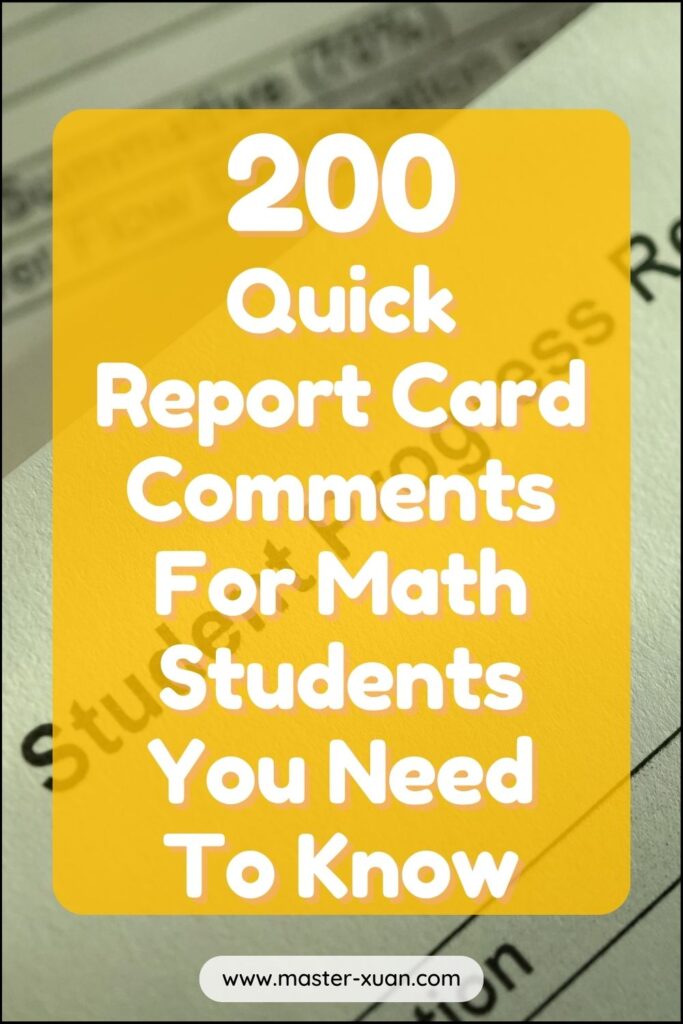
Academic Performance
Positive Report Card Comments For Math Students:
- [Student’s name] demonstrates a deep understanding of how to use technology to solve problems and complete tasks.
- [Student’s name] demonstrates a good understanding of all math concepts studied and communicates with clarity and good justification of reasoning.
- [Student’s name] has a good understanding of all math concepts taught so far this year.
- [Student’s name] continues to turn in excellent assignments and especially enjoys hands-on math activities.
- [Student’s name] has a strong foundation in math and excels in [specific math concepts].
- [Student’s name] has an excellent attendance record and is rarely absent from class.
- [Student’s name] has an outstanding math foundation.
- [Student’s name] has made excellent progress in all subjects this year.
- [Student’s name] has shown significant improvement in [specific subject].
- [Student’s name] is a strong problem-solver and can think critically to find solutions.
- [Student’s name] is able to follow instructions carefully and complete tasks as assigned.
- [Student’s name] is highly skilled at leveraging technology to enhance their learning.
- [Student’s name] is very accurate in their work and pays close attention to detail.
- [Student’s name] math skills continue to improve steadily.
- [Student’s name] shows a love for learning new things.
- [Student’s name] shows curiosity and asks thoughtful questions.
Needs Improvement Comments:
- [Student’s name] continues to have trouble in a few key areas.
- [Student’s name] doesn’t always review/check his/her work, which leads to careless mistakes.
- [Student’s name] is having a difficult time in certain areas of math.
- [Student’s name] is having considerable difficulty with [specific math concepts].
- [Student’s name] is having considerable difficulty with math. I recommend he/she work on studying [specific math concepts] and [specific math concepts].
- [Student’s name] is having trouble with math tests.
- [Student’s name] is performing poorly in math class and doesn’t make an effort to understand the concepts.
- [Student’s name] is struggling to keep up in math.
- [Student’s name] is struggling to keep up in math.
- [Student’s name] often struggles to remember content that has already been covered in class and would greatly benefit from some extra practice at home.
- [Student’s name] would benefit from slowing down and reading the set questions carefully.
- [Student’s name] should take more time to read and understand the questions carefully before answering.
- [Student’s name] should avoid rushing through questions and take the time to process the information.
- [Student’s name] should read each question multiple times if necessary to ensure they fully understand what is being asked.
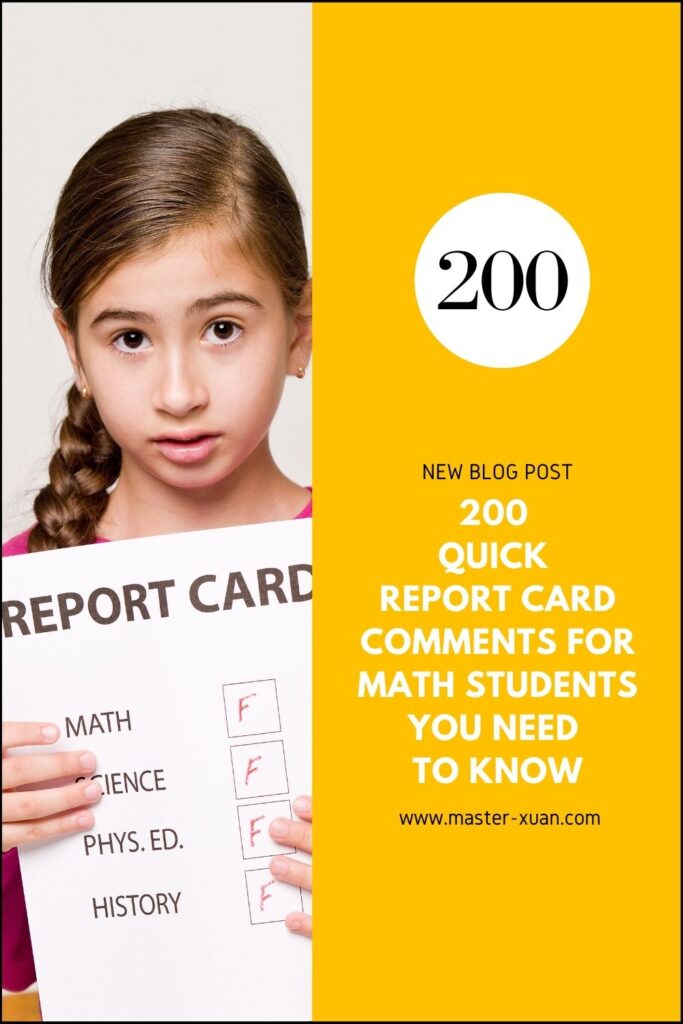
Math Skills Report Card Comments
Positive Report Card Comments For Math Students:
- Academic Progress: [Student’s name] is making excellent progress in developing the skills and strategies needed for [division of 3 digits number].
- Arithmetic: [Student’s name] is skilled in [addition and subtraction within 100], and can apply both concepts to word problems.
- Conceptual Understanding: [Student’s name] has a strong understanding of the relationship between [multiplication and division] and can confidently apply this knowledge.
- Data Analysis: [Student’s name] is able to read [pictographs, bar graphs, pie chart, etc.].
- Fractions: [Student’s name] can accurately identify fractions with denominators less than or equal to 12.
- Geometry: [Student’s name] can accurately identify and categorize [quadrilaterals based on their properties].
- Mathematical Reasoning: [Student’s name] can clearly explain their thinking and provide evidence to support their answers.
- Measurement: [Student’s name] has a good understanding of measurement concepts and can convert metric systems of units.
- Memorizing: [Student’s name] is quick in memorizing [timetables, formulas, math vocabularies, etc.]
- Number Sense: [Student’s name] demonstrates a solid understanding of [place value concepts] and can accurately [add and subtract 10 and 100].
- Operations: [Student’s name] can solve a variety of [addition, subtraction, multiplication, or division] problems involving [two or more quantities, decimals, etc.].
- Problem-Solving Strategies: [Student’s name] effectively uses visuals such as [number lines, ten frames, etc.] to solve mathematical problems independently.
- Problem-Solving: [Student’s name] consistently applies grade-level problem-solving strategies independently when presented with unfamiliar problems.
- Real-World Applications: [Student’s name] can connect mathematical concepts to real-world situations, such as [counting money, and mental math strategies].
- Word Problems: When solving complex word problems, [Student’s name] is able to use the strategies taught to solve them.
Needs Improvement Comments:
- Academic Progress: [Student’s name] needs to work on developing the skills and strategies needed for [adding and subtracting within 20].
- Arithmetic: [Student’s name] demonstrates a consistent and sound understanding of arithmetic, but requires a lot of time to solve problems.
- Circles: While [Student’s name] understand the relationship between radius and diameter, he/she sometimes uses the wrong one to find the area and circumference of a circle.
- Conceptual Understanding: [Student’s name] could benefit from additional practice to strengthen their understanding of the relationship between [multiplication and division].
- Data Analysis: [Student’s name] should practice more on reading graphs of different scales.
- Effort: [Student’s name] clearly displays a strong effort in math class, but still struggles with [word problems, reading graphs, etc.]
- Foundation: [Student’s name] has a weak math foundation and needs to review past concepts more frequently.
- Fractions: [Student’s name] has trouble converting fractions with denominators less than or equal to 12 into decimals.
- Geometry: [Student’s name] needs to review the properties of different quadrilaterals and practice identifying and categorizing them.
- Homework: [Student’s name] needs more opportunities to practice his [math skills] at home.
- Mathematical Reasoning: [Student’s name] needs to work on clearly explaining their thinking and providing evidence to support their answers.
- Measurement: [Student’s name] can use some measurement tools but struggles to read the protractor accurately.
- Measurement: [Student’s name] should practice converting metric systems of units.
- Memorizing: [Student’s name] experiences difficulty memorizing [timetables, formulas, math vocabularies, etc.]
- Number Sense: [Student’s name] needs to improve their understanding of [place value concepts] and practice [adding and subtracting 10 and 100].
- Operations: [Student’s name] should practice solving a variety of [addition, subtraction, multiplication, or division] problems involving [two or more quantities, decimals, etc.].
- Patient: [Student’s name] is sometimes impatient in solving [complex word problems] which results in careless mistakes.
- Problem-Solving Strategies: [Student’s name] could benefit from more practice using visuals such as [number lines, ten frames, models etc.] to solve mathematical problems independently.
- Problem-Solving: [Student’s name] could benefit from additional practice applying grade-level problem-solving strategies independently.
- Properties of Quadrilaterals: [Student’s name] has trouble applying the properties to find the missing angles in a quadrilateral.
- Real-World Applications: [Student’s name] should practice connecting mathematical concepts to real-world situations, such as [counting money, and mental math strategies].
- Retention: Even with the teacher explaining the [math concept] multiple times, [Student’s name] still struggles to retain it.
- Word Problems: [Student’s name] can understand word problems but often rushes through his/her work, which causes mistakes.
- Word Problems: When solving complex word problems, [Student’s name] sometimes becomes overwhelmed with the information and can’t process them.
- Workings: [Student’s name] doesn’t always write down the solution to the math problems.
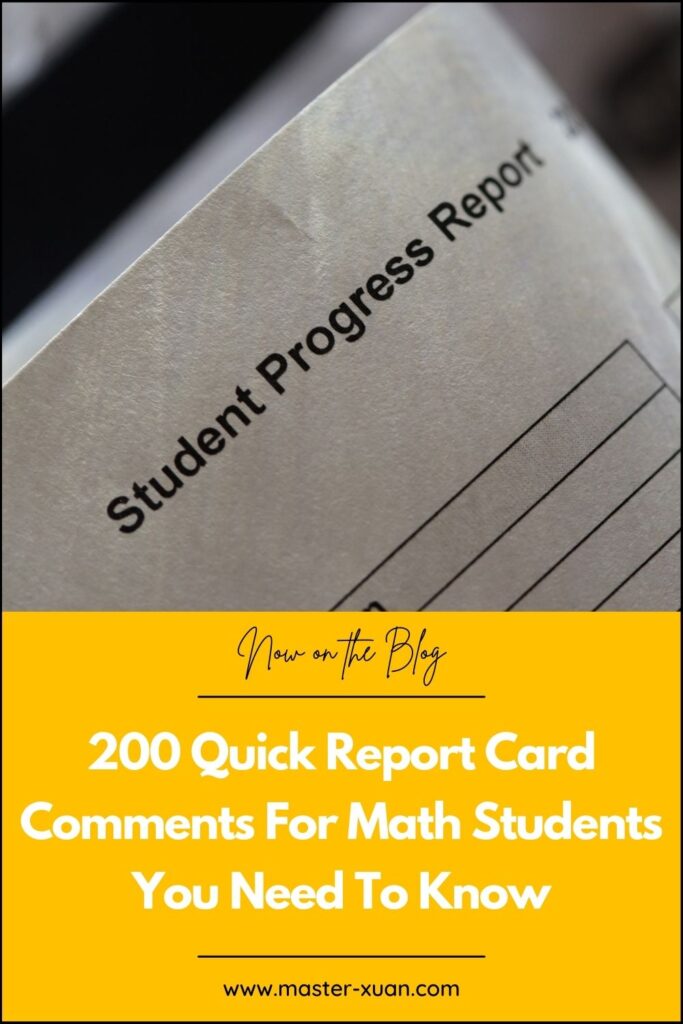
Last Report Card Statement
- Celebrate Achievements: “I commend [Student’s name] for their recent achievements in [specific area].”
- Encourage Continued Effort: “I encourage [Student’s name] to continue their hard work and dedication.”
- Provide Positive Reinforcement: “I appreciate [Student’s name]’s positive attitude and willingness to learn.”
- Offer Words of Wisdom: “Remember, every challenge is an opportunity for growth.”
- Express Gratitude: “Thank you for being a wonderful student and contributing positively to our class.”
- Believe in Their Potential: “I am confident in [Student’s name]’s ability to overcome these challenges and reach their full potential.”
- Suggest Strategies for Improvement: “With additional support and practice, [Student’s name] can develop the necessary skills to succeed.”
- Offer Collaboration with Parents: “We are committed to working collaboratively with [Student’s name] and their family to address their needs and provide the necessary support.”
- Offer Guidance and Support: I am committed to providing the support and resources needed to ensure [student’s name]’s success.
- Set Achievable Goals: “Together, we can create a personalized plan to help [Student’s name] achieve their goals, such as improving their [specific skill].”
- Encourage Self-Reflection: “I encourage [Student’s name] to reflect on their progress and set new goals for the future.”
- Express Optimism for the Future: “I am optimistic that [Student’s name] will continue to grow and develop as a learner, with the right support and guidance.”
- Look Forward to the Future: “I look forward to seeing [Student’s name] continue to thrive and succeed.”
- Offer Words of Wisdom: “Remember, setbacks are temporary, and perseverance is key.”
- Provide Motivation: “Keep up the good work, [Student’s name]! You have the potential to achieve great things.”
- Practice Mindfulness: “Take time for self-care and mindfulness. These practices can help you manage stress and focus.”
Conclusion
I hope these quick report card comments for math students make it easier for you. They might not be perfect, but I hope they can give you some ideas and inspiration.
Related Read: How To Give Positive Comments For Students With Behavior Problems

